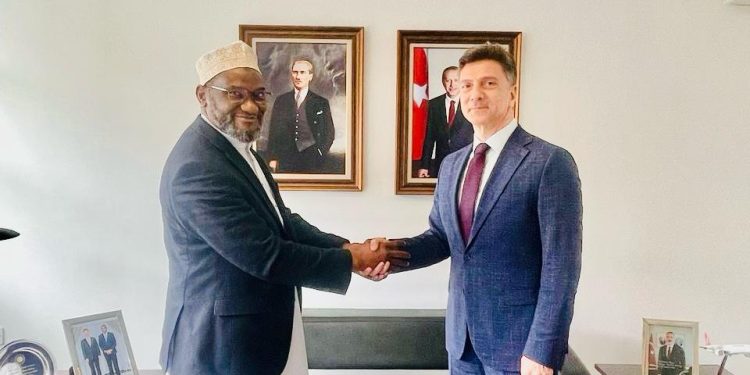ADVERTISEMENT
Thousands of Muslims stuck in C. African Republic
Krista Larson – March 29, 2014
BODA, Central African Republic (AP) There is only one neighborhood in Boda where Muslims are safe from the bullets and machetes of Christian militia fighters. Many who ventured out were killed, their throats slit or their cars showered in gunfire.
Even the dead must obey: Muslim bodies are buried behind an old warehouse because the traditional Muslim cemetery is now off limits.
Boda is home to one of the largest Muslim communities left in Central African Republic. About 4,000 Muslims are trapped here and they say they are suffering and just want to leave after months of being targeted by the militia. Their plight is mirrored throughout the country.
Aliou Alidu stays inside the boundaries of Boda’s Muslim neighborhood even as the 18-year-old’s arms and legs throb from deep burns. Days earlier, his home was set ablaze by a Christian mob and he survived death by crawling out a window. There is no pain medicine here. The only doctors live on the Christian side of town, a trip he says is more likely to kill him than his burns.
There used to be a man who could link the two neighborhoods a Christian who had long ago converted to Islam. He is now dead, along with hopes here that these two communities may ultimately reconcile.
“For generations, our families lived together and even intermarried. Now you want to kill us all?” laments Mahamat Awal, Boda’s mayor, who is among those stuck in this town 100 miles (160 kilometers) southwest of the capital.
He meets regularly with the French forces in town and the Christian fighters known as the anti-Balaka. At each meeting the militiamen make their point clear: Every Muslim must leave the town without exception even the mayor.
Nearly 300,000 people already have fled the sectarian violence that erupted in Central African Republic in early December when anger erupted against the Muslim rebels known as Seleka, who had overthrown the government. When they fled from power in late January, civilians turned on their Muslim neighbors, accusing them of having collaborated with the brutal regime.
Despite the mass evacuations, the United Nations warns that about 15,000 Muslims remain blockaded “in an extremely dangerous and untenable situation” such as in Boda.
As a result, peacekeepers and humanitarian agencies face “terrible dilemmas such as choosing between unwillingly aiding the ‘cleansing’ of confined Muslim populations, or leaving them against their will in places where they are in real danger of being slaughtered en masse,” Navi Pillay, the U.N. High Commissioner for Human Rights said after a recent visit to the capital.
In Bangui, the capital, the several thousand Muslims who remain say they don’t step outside their last remaining neighborhoods and even then some have been killed hundreds of meters (yards) away from the area mosque. And in the southwest, some 1,000 Muslims are still sheltering at a Catholic church, too scared even to let their children play soccer for fear that a stray ball could lead them outside where they could be attacked by Christian militiamen.
“People are desperately wanting to leave because they’re in fear for their lives, and they haven’t been able to leave initially because they couldn’t afford it and now there’s no transport whatsoever,” said Joanne Mariner, a senior crisis adviser with Amnesty International.
“To give those people a solution out is protecting them. I think obviously what the international community needs to be doing is providing greater security and coming up with a long-term strategy to ensure that the people who leave are able to return in the future,” she added.
That is much further ahead, though, than many in Boda want to look right now.
Ousmane Nana, 49, his wife and six children are among those in Boda who say they just want out no matter what. Born and raised in the town, Nana says he never felt a sense of otherness or fear until Jan. 29, when the Muslim rebels fled town after months of brutal rule.
That was the night a group of some 30 young people armed with rifles and machetes attacked him, leaving deep gashes across his back. More than a month later, the bullet wound to his left arm is still healing. Now he waits for the day peacekeepers will evacuate Muslims from Boda and take him to neighboring Cameroon.
Thieves already have stolen his four-by-four vehicle, taken all his money, even the clothes off his back. French patrols continue in the town, but the brutal assault has eroded Nana’s sense of security. He says many of his attackers were people he’d given free rides to as a driver around town.
“I was certain I was going to die that night,” he says. “The good God did not allow it. Now I will leave the very first chance I get.”



















